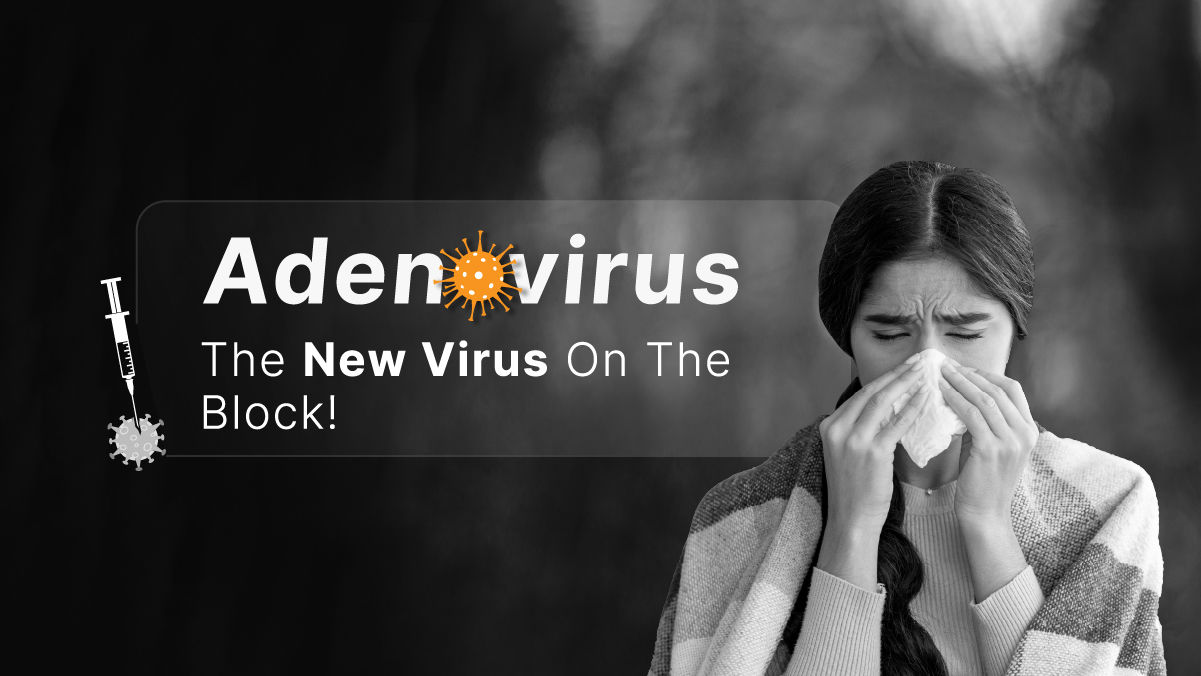Respiratory Health
Adenovirus Wreaking Havoc In Kolkata. Know All About The Virus!
4 min read
By Apollo 24|7, Published on - 02 March 2023, Updated on - 20 June 2023
Share this article
0
13 likes

West Bengal has been experiencing a sudden spike in adenovirus cases. It has been reported that nearly 30% of the samples sent to the National Institute of Cholera and Enteric Diseases in Kolkata have tested positive for this virus. As of 2nd March 2023, 12 deaths have been reported across the state. According to the Director of Health Services, West Bengal, Dr Sidharth Niyogi, the adenovirus surge went unnoticed because of the pandemic in the last couple of years, however, people must not panic. Let us know more about this virus and how it can be prevented.
What Is Adenovirus?
Adenoviruses are a group of common viruses that result in mild colds or flu-like illnesses. According to the US Centres for Disease Control and Prevention (CDC), adenoviruses affect people from all age groups and can occur at any time of the year. There are about 50 different types of adenoviruses that can infect human beings. They are one of the primary causes of mild fever, coughs, sore throats and diarrhoea. People infected with an adenovirus tend to get better within a few days. However, if you have a weak immune system then it can lead to several complications, especially in children.
How Do Adenoviruses spread?
Adenoviruses are quite contagious and can easily spread through coughing or sneezing by an infected being. These coughs and sneezes lead to the release of virus-containing droplets into the air which lands anywhere. It spreads most commonly among children since they are more likely to put their hands on their faces or in their mouths after touching these surfaces. These viruses are common in places that have large groups of children playing or interacting together at a time including daycare centres, schools, excursions and parks.
How Do Adenoviruses Affect People?
Adenovirus infection often leads to symptoms that have a mild impact on your overall health such as cough, cold and fever. However, people with a weaker immune system are at a higher risk of developing serious illnesses if they contract the virus. Some common symptoms caused by adenovirus include:
- Common cold or flu
- Fever
- Sore throat
- Chest congestion
- Pink eye (conjunctivitis)
- Ear infection or otitis
- Swollen lymph nodes
- Runny nose
Less common symptoms caused by adenoviruses include:
- Bladder infection or inflammation
- Neurological disorders affecting the brain and spinal cord.
Most adenovirus symptoms do not last longer than a few days. However, in the case of severe infections, the symptoms may last longer than a few weeks.
How To Diagnose Adenovirus Infection?
A doctor might consider conducting a physical exam that may involve multiple tests for a diagnosis report. These tests will analyse the extent of infection that the virus or bacteria has caused. Some of these tests include:
- Blood test: A blood test of the infected person shall be collected from a vein in their arm.
- Urine test: You shall be asked to provide a urine sample to analyse the viral growth.
- Swab test: A sample of your saliva and nasal mucous would be collected through the mouth and nose.
- Stool test: More commonly used for children, a stool test requires a sample of your child’s poop for further analysis.
- Chest X-ray: This is majorly done to analyse the condition of the heart and lungs.
How To Prevent Adenoviruses’ Infection?
Adenovirus infection can be prevented easily by following hygienic lifestyle practices. You can protect yourself by following a few simple steps:
- Washing your hands with soap and water for at least 10 to 20 seconds.
- Avoid touching sensitive parts of your body such as the eyes, nose or mouth without washing your hands.
- Avoid close contact with people that are experiencing similar symptoms.
If you are already infected with an adenovirus then you can help protect others by adopting the following steps:
- Stay at home till you recover completely.
- Always cough and sneeze into a tissue and not the air or your hands.
- Do not share your cups and eating utensils with others.
- Avoid kissing others till you have fully recovered.
- Wash your hands regularly, especially after using the bathroom.
How To Treat Adenovirus Infection?
There are no specific antiviral treatments approved for curing adenovirus infections. Therefore, the treatment focuses on treating the symptoms. You can make yourself or your child feel better by following the measures:
- Staying hydrated: Try consuming water and fruit juices to stay hydrated during this infected period. You can also try giving your child an oral rehydration solution (ORS) rich in electrolytes.
- Clear congestion: A saline spray or nose drops can help clear the mucus present in your or your child’s nose.
- Using a cool-mist humidifier: This will add moisture to the air and will help in loosening congestion.
- Bringing the fever down: Use over-the-counter available medications to keep the fever from rising.
Adenoviruses, if goes unattended, can lead to several complications over time, especially if you or your child has a weaker immune system. If you or someone you know continues to experience the aforementioned symptoms over a long period, then you should seek professional help as soon as possible.
Medically reviewed by Dr Sonia Bhatt.
Respiratory Health
Leave Comment
Recommended for you

Respiratory Health
Suffering From COPD? These 9 Exercises Can Help Relieve Symptoms
Although there is no permanent cure for COPD, exercises can help ease the symptoms and strengthen the lungs to a great extent.

Respiratory Health
Can Seasonal Air Pollution Affect Respiratory Health?
Polluted air becomes a major public health emergency with the arrival of the winter season every year.

Respiratory Health
Violent Coughing: Could It Indicate a Serious Infection?
Whooping cough is a contagious respiratory disease caused by the bacterium Bordetella pertussis and is characterised by violent coughing.
Subscribe
Sign up for our free Health Library Daily Newsletter
Get doctor-approved health tips, news, and more.
Visual Stories

Managing COPD During the COVID-19 Pandemic
Tap to continue exploring
Recommended for you

Respiratory Health
Suffering From COPD? These 9 Exercises Can Help Relieve Symptoms
Although there is no permanent cure for COPD, exercises can help ease the symptoms and strengthen the lungs to a great extent.

Respiratory Health
Can Seasonal Air Pollution Affect Respiratory Health?
Polluted air becomes a major public health emergency with the arrival of the winter season every year.

Respiratory Health
Violent Coughing: Could It Indicate a Serious Infection?
Whooping cough is a contagious respiratory disease caused by the bacterium Bordetella pertussis and is characterised by violent coughing.
